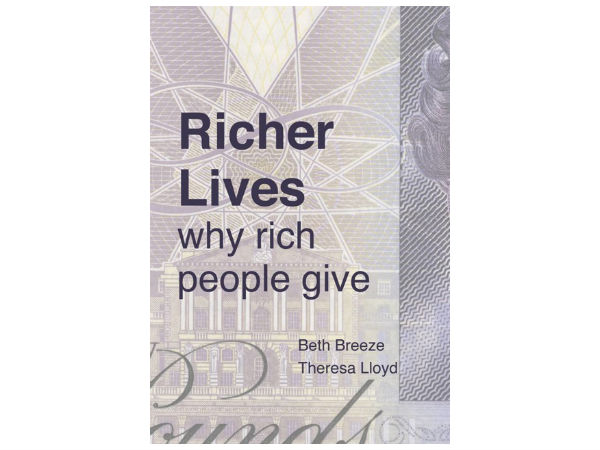Why do wealthy donors give to charity? New book ‘Richer Lives’ explains
To find out what motivates rich people to give to charity, University of Kent academic Dr Beth Breeze and leading philanthropy adviser Theresa Lloyd interviewed 82 wealthy UK donors. The results of their research have been published in a new book, ‘Richer Lives: why rich people give”.
The book follows on from a study about wealthy donors published 10 years ago. Indeed, 40 of the donors interviewed took part in the original research.
The authors reveal that philanthropy has changed in the past 10 years. Now almost all those who give substantial amounts of money also give substantial amounts of their time. This can of course prove a challenge to charities with limited skills and resources in channelling this effectively.
Advertisement

Major donors acknowledge that fundraisers have become more professional over the past decade and are much better at researching potential donors and understanding how different donors may want to engage with a charity.
The economic crisis has changed major donors’ views of their wealth. Despite being objectively wealthy, many do not feel financially secure, an attitude which serve as a barrier to giving more.
The authors make clear that, while wealthy donors give for a number of different reasons, “almost every rich donor we interviewed expressed the view that giving enriches their life.” A similar message was reported in John Nickson’s Giving Is Good For You, published this year. The personal benefits of giving create a virtuous circle leading to deeper and longer-lasting commitments to good causes, which in turn heightens the enjoyment and satisfaction of using money for good.
In contrast, it includes a chapter considering why many of the wealthiest in the UK do not give much or anything to charity.
Wealthy donors’ attitudes to giving
The book includes a number of recommendations for increasing the number of wealthy people who give to charity and the amount given. For example, donors are encouraged to ask their wealthy friends and contacts to give at comparable levels, not least because potentia givers prefer to be asked by someone they know and trust.
It also highlights a number of attitudes that fundraisers at least should be aware of. For example:
- wealthy donors say that a ‘serious’ gift has to be at least £10,000, and gifts of this size and larger should yield access to the charity’s leaders.
- philanthropists are keen to be strategic in their giving, tackling underlying causes rather than symptoms, and exploring now opportunities for giving such as social investment
- many donors perceive people working in charities as well-intentioned but inefficient. Rich donors need reassurance and proof that charities can and will make best use of their donations.
- philanthropists have not forgotten the insulting suggestion that they were ‘tax dodgers’ contained in government proposals in the 2012 Budget to cap charity tax relief
Interview with Theresa Lloyd



